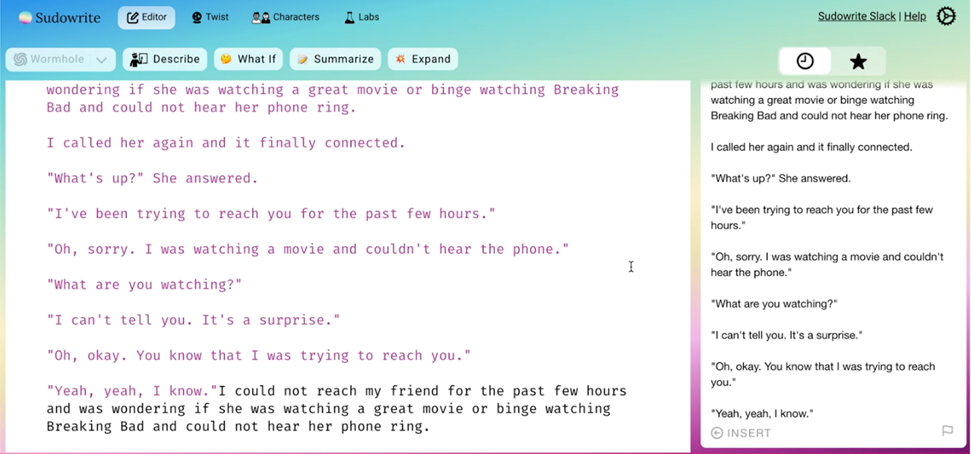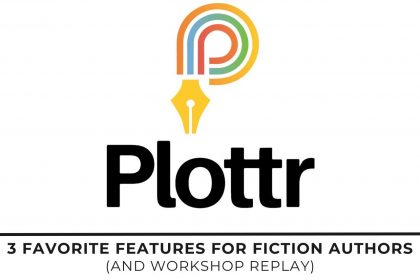
It’s a brave new world, and there’s no going back.
Artificial Intelligence and what it means for us, our children, and grandchildren jars my mind. It is the world of wormholes and robots, and I have just arrived. It’s not science fiction. It’s not the future– it’s today.
You May Already Be Using AI
I am. As a writer, I find Grammarly, an intelligent proofreading tool, handy. I am always looking to eliminate words and find better ones. It even customizes recommendations based on my writing goals for that piece.
Grammarly gives just a glimpse into the world of AI. The AI apps providing tools for writers grow by the week–if not daily. The possibilities are endless.
If you use Google, GPS, Alexis, Facebook, Microsoft Word… you are using AI.
AI in Publishing
You can already find AI-generated novels available on the market. 1 the Road, Dinner Depression, and World Clock to name a few.
How’s the writing you may ask? Soumya Kundu of the Research Nest notes the books don’t make much sense, but the descriptions are of “high” quality. So, no award winners yet, but that may not be the case much longer.
AI: The Future for Writers
As AI becomes more mainstream, so too do the AI apps specifically for writing.
For example, Sudowrite–an AI app in beta testing– invites writers to expand their literary masterpieces by entering the world of wormholes.
wormhole (noun)
A hypothetical structure of space-time envisioned as a tunnel connecting points separated in space and time, aka tunnels created between two black holes in space, taking you to another universe. – Merriam Webster
When using Sudowrite, you enter text–your thoughts–into this wormhole. You can use the expand feature, and it provides you with dialogue and a storyline. API (Application Programming Interface) attempts to match the patterns you give it. You can program Sudowrite by giving it a few examples of your writing style. Click on other features and get detailed aid on character development and plot. It even gives you ideas for new characters and plot twists. If you just enter a few words, it doesn’t work as well. The more you enter, the more of a grasp it gains of your thoughts and styles.

(C.Tamboly/featured on Youtube)
AI apps work with both fiction and non-fiction. Kafka, another Natural Language Generation (NLG) app, has a plain style, but Sudowrite works well with “distinctive literary styles.”
After beta testing when the app becomes available to a more extensive customer base, Sudowrite may cost as little as $15-$20 a month.
Current AI Tools
Just a few of the amazing AI tools available today are…
- Shortly.ai – AI writing assistant. Generates text for articles and for novels.
- Inferkit – Text generation interface that also allows custom generator setup
- AIArtists.org Resource page – creative tools for all kinds of artistic projects in collaboration with AI
- Bored Humans Poetry Generator – and lots of other applications, e.g., story generator, quote generator
- List of poem generators and examples
- AI Dungeon — Gaming style story generation
- AI Channels – messaging app research tool for chatting with AI in different channels, e.g., Writermatic, Wells & Verne
Supercomputers And Natural Language Generation
We entered this new universe of Artificial Intelligence with the advent of supercomputers. Today, the supercomputer, GPT-3, generates language. The consequences are daunting.
Sudowrite uses the most recent version of a deep-learning neural (brain-like) network to generate text. We can think about it as “deep learning” because the neural networks have various deep layers that enable learning–just about any problem requiring thought can be solved using deep learning.
Natural Language Generation (NLG) creates natural-sounding written data. NLG software is in use today in business data reports, intelligent content, client financial portfolio updates, dashboards, emails, and in-app communication, and more.
The NLG solution constructs the narrative design or template, depending on what format of the content is needed: social media posts, financial reports, poetry, etc.
Some of the other NLG apps now available are:
- Quillbots (summarizes, paraphrases, finds synonyms, checks grammar, and is integrated with Chrome and Google Docs as an extension)
- Amazon Polly (Text-To-Speech aides people who can’t read, among other uses)
- Wordsmith (auto-generates articles and natural language)
- Google's Text-To-Speech and some in-house tools like Heliograf at the Washington Post.
The Advantages of Artificial Intelligence
The advantages of AI in the writing, publishing, and marketing world are undeniable.
- Writer’s block? Not anymore. With AI apps, writers can instantly receive suggestions to propel their writing forward.
- Online booksellers like Amazon utilize complex algorithms based on a buyer’s history to determine what books someone might enjoy. This type of AI not only increases sales, but also helps readers discover authors they may never have stumbled upon otherwise.
- News outlets benefit because AI produces breaking stories instantly–no journalist or content creator needed to compose these stories and relevant content.
- Websites benefit from quick and easy content. After only a prompt, AI software can write poetry, novels, and news or blog articles. Even if a writer comes up with the original idea and crafts the story, AI can provide editing and proofreading to quickly get content publication ready.
- AI gives companies tools to save time and money on manual work. Businesses gain reliable insights without the possibility of human error and the bonus of improved data and reliability over time with increased usage. You will fall behind the competition if you aren’t using AI marketing. Mark Apaia at No Good speculates. “Artificial intelligence is not a luxury, but a necessity in any marketing strategy.”
- Another plus is Natural Language Processing (NLP). NLP extracts important messages and key insights from graphs and charts, making data easier to understand for those not data experts.
The Disadvantages of Artificial Intelligence
The disadvantages of Artificial Intelligence are concerning and must also be considered.
- We can not ignore the troubling ethical questions AI presents. AI produces such coherent, natural-sounding language that it can be difficult to tell if a human or AI writes it. Writers must now decide if it’s ethical to take credit for written work created by a machine. Publishers and teachers face the difficulty of determining who wrote the AI-created piece– if the writer/student cheated. The New York Times even created a website to test to see if you can decide if a piece of writing is written by AI or by a human.
- The ethical dilemmas AI presents on a broader scale are real and dangerous. AI produces “convincingly fake news” that governments and the military could use to do great harm. A. Tarantola reports China’s gigantic multi-modal AI is ten times the size of Open AI’s GPT-3. The possibilities have the makings of sci-fi thrillers.
- While the convenience of AI created content is an advantage, the quality of the AI written work can be a considerable drawback–it is often sub-par to writing crafted by humans. Heba Soffar of Online Science compares the writing to “a low-paid content spinner.” She warns, “AI systems generate the story word-by-word. The resulting text is often coherent, but rarely truthful, all quotes & attributions are fabricated, the composition of that information is intended to be unique but it can be based on sentences already published online. The system spits out passages of text that do not make a lot of sense structurally, or contain laughable inaccuracies.”
- The job market may be impacted as humans are replaced by AI. AI writers don’t need sleep, vacations, or health insurance. AI accomplishes tasks with incredible speed and accuracy and is already replacing journalists in newsrooms. Gartner predicts by the end of 2024, 75% of organizations will be using “operationalizing AI, driving a five times increase in streaming data and analytical infrastructures.”
AI Is Here to Stay
The brave new world of artificial intelligence is one we might want to get familiar with soon. We live in a day where everything changes rapidly–that requires us to be life-long learners. We can debate the ethical implications all day long, but AI is here to stay.
As writers and publishers, we can choose to embrace AI to help increase productivity and accuracy while still celebrating and honing the craft of the written word.
As Kevin Kelly articulates so well in The Inevitable: Understanding the 12 Technological Forces that will Shape our Future, “This is not a race against the machines. If we race against them, we lose. This is a race with machines. You’ll be paid in the future based on how well you work with robots…It is inevitable. Let the robots take our jobs, and let them help us dream up new work that matters.”
To find the best way forward in the writing, publishing, and marketing world, we must embrace the good, recognize the bad and embrace the challenge of discerning which is which.
Katherine Steiger is a ranch-girl always–growing up on ranches located in Northeastern Wyoming and Northwest Arkansas. Wyoming lives in her memory, and she writes from that place.
She is a mother to three girls and 12 grandchildren. As much as she loves traveling, she loves these familiar faces more.
She graduated with honors in English Education and taught school for a year in a private school located on a ranch outside Uvalde, Texas.
Learn more about Katherine and connect with her directly at https://www.katherineandpen.com/.








